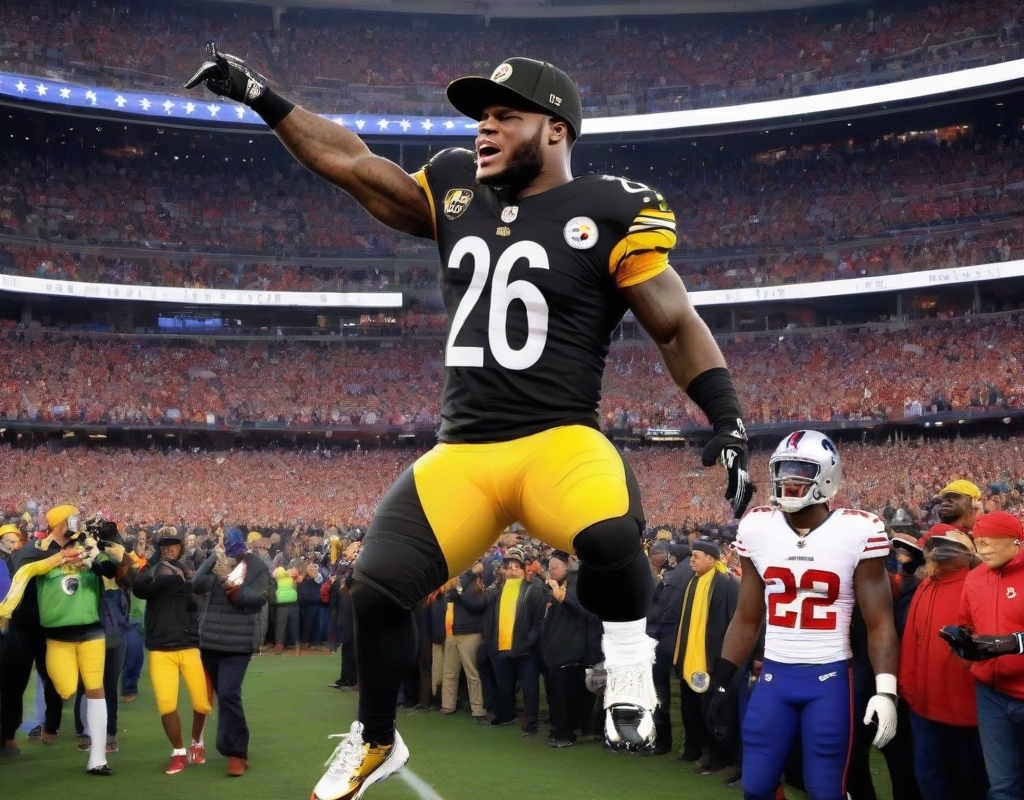Sports and politics often intermingle in ways that can polarize, intrigue, and inspire societal dialogue. The celebration by former NFL star Le’Veon Bell of Donald Trump’s recent electoral victory is a vivid example of this complex interplay. Bell, renowned for his achievements in football, has also been a vocal supporter of Donald Trump, making his enthusiasm for Trump’s victory a catalyst for varied reactions across the sports world and beyond.
Bell’s exuberant response to the election results was captured in a widely shared video where he was seen joyously dancing while sporting a “Make America Great Again” hat. This act was not just a personal celebration but a public display of his consistent support for the former president. During Trump’s presidency, Bell had openly expressed his admiration, and even controversially declared he would leave the U.S. if Kamala Harris were elected, underlining the depth of his political convictions.
Following the release of his celebration video, Bell faced a barrage of criticism online. Some detractors resorted to derogatory remarks, while others speculated about his mental health, hinting at possible impacts of Chronic Traumatic Encephalopathy (CTE), a brain condition linked to repeated head injuries common in football. Resilient in the face of critique, Bell took to social media to vehemently reject these accusations and reiterate his positions. His words, sharp and defiant, showcased his determination to stand unwaveringly by his beliefs regardless of public opinion.
Bell’s supportive stance towards Trump isn’t new. Previously, during the election period, he was seen at rallies advocating for Trump’s re-election, exemplifying how athletes can wield their influential status to sway political sentiments or catalyze discussions. The visibility of such actions often elicits diverse opinions from the public and fans, reflecting the polarizing nature of political discourse today.
While Bell’s reaction represented a segment of the athletic community, other sports personalities expressed starkly contrasting views. For instance, WNBA star Angel Reese publicly shared her disappointment, mirroring the sentiments of others who felt disillusioned by the election results. Similarly, basketball icon Sheryl Swoopes expressed her distress via social media. These reactions underscore the varied political leanings within the sports community and highlight how significant societal events can evoke strong and diverse responses among athletes.
LeBron James also voiced his concern, reflecting a more personal perspective by sharing his worries about the implications of the election outcome for his family, particularly his daughter. His response, like those of Reese and Swoopes, offers insight into the profound personal and communal impact of political developments on individual athletes.
In the milieu of these varied reactions, Bell’s assertiveness in his support for Trump stands out as particularly bold. “I ain’t going nowhere. I’m here to make America great. Donald Trump for President!” he declared, encapsulating his determination to not be swayed by opposition or controversy. This stance highlights an important facet of today’s cultural climate in the U.S., where political divisions can be pronounced and discussions heated.
The involvement of sports figures like Bell in political discourse underlines the significant platform that athletes hold, capable of influencing public opinion and igniting societal dialogues. Historically, athletes have leveraged their visibility to bring attention to social justice issues, advocate for political change, and foster community awareness. From Muhammad Ali’s activism during the civil rights movement to Colin Kaepernick’s kneeling protest against police brutality, sports professionals have demonstrated that their roles extend far beyond the playing fields.
Bell’s celebration of Trump’s victory brings these dynamics into sharp relief, showing not only how intertwined sports and politics have become but also the influential potential of athletes to shape and reflect societal currents. The diverse reactions from Bell and his peers underscore the multiplicity of views in the sports world and illustrate how the sector remains a microcosm of wider societal divisions and debates.
As the landscape of public discourse continually evolves, the voices of athletes such as Bell will undoubtedly play a pivotal role in shaping political and social narratives. Their platforms offer a unique opportunity to bridge divides, encourage discussions, and foster understanding across different communities. Whether one agrees or disagrees with Bell’s political positions, it is clear that he, like many other athletes, is a vital participant in the broader dialogue about the roles and responsibilities of public figures in political and social arenas. Bell’s unwavering stance and the varied reactions it elicited serve as a powerful reminder of the profound impact of sports on political and societal contexts, marking an ongoing evolution in the dynamic intersection between these spheres.




